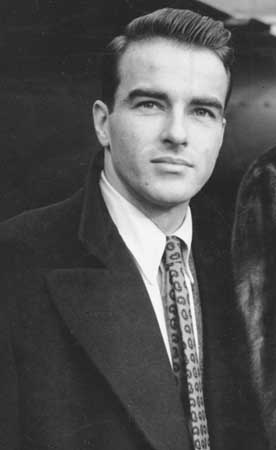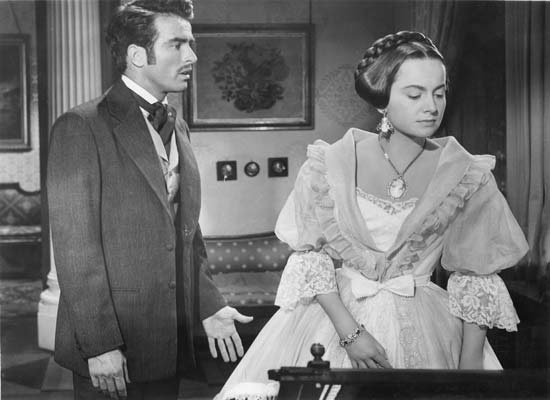Clift, Montgomery
American actor
in full Edward Montgomery Clift
born October 17, 1920, Omaha, Neb., U.S.
died July 23, 1966, New York, N.Y.
 American motion-picture actor noted for the emotional depth and sense of vulnerability he brought to his roles. Along with Marlon Brando (Brando, Marlon, Jr.) and James Dean (Dean, James), he helped delineate a new paradigm for American cinematic heroes.
American motion-picture actor noted for the emotional depth and sense of vulnerability he brought to his roles. Along with Marlon Brando (Brando, Marlon, Jr.) and James Dean (Dean, James), he helped delineate a new paradigm for American cinematic heroes.Clift's childhood was unconventional. His family moved frequently, and Clift spent a significant amount of time in Europe. When he was 12 he auditioned for a theatre company in Sarasota, Florida, and won a role in As Husbands Go. From 1934 to 1945 he performed regularly on and off Broadway, appearing in such notable plays as Robert Sherwood (Sherwood, Robert E.)'s There Shall Be No Night (1940), Thornton Wilder (Wilder, Thornton)'s The Skin of Our Teeth (1942), and Lillian Hellman (Hellman, Lillian)'s The Searching Wind (1944). He worked with, among others, actor Alfred Lunt (Lunt and Fontanne) and director Robert Lewis (both of whom served as mentors) and became known for the intelligence and dedication he brought to his work.
 Owing to his striking good looks and his success on the stage, Hollywood studios soon began wooing Clift. He turned down several offers, however, before accepting roles in Howard Hawks (Hawks, Howard)'s Red River (1948) and Fred Zinnemann (Zinnemann, Fred)'s The Search (1948). Both films were immensely successful and secured for Clift a reputation as one of the most promising young movie actors of his generation. He received an Academy Award nomination for The Search, but Red River achieved landmark status and is considered by many to be one of the best westerns ever made. In Red River Clift portrayed an earnest and sensitive young cowboy who challenges the authority of his adoptive father, a rough, hardened rancher played by the archetypal American cowboy, John Wayne (Wayne, John). Similarly, Clift himself—with his introspective acting style and his ability to combine compassion with ruggedness—challenged the validity of traditional definitions of masculinity and screen heroism.
Owing to his striking good looks and his success on the stage, Hollywood studios soon began wooing Clift. He turned down several offers, however, before accepting roles in Howard Hawks (Hawks, Howard)'s Red River (1948) and Fred Zinnemann (Zinnemann, Fred)'s The Search (1948). Both films were immensely successful and secured for Clift a reputation as one of the most promising young movie actors of his generation. He received an Academy Award nomination for The Search, but Red River achieved landmark status and is considered by many to be one of the best westerns ever made. In Red River Clift portrayed an earnest and sensitive young cowboy who challenges the authority of his adoptive father, a rough, hardened rancher played by the archetypal American cowboy, John Wayne (Wayne, John). Similarly, Clift himself—with his introspective acting style and his ability to combine compassion with ruggedness—challenged the validity of traditional definitions of masculinity and screen heroism.Clift reached the peak of his Hollywood career with George Stevens (Stevens, George)'s A Place in the Sun (1951) and Zinnemann's From Here to Eternity (1953), both of which earned him Academy Award nominations. In A Place in the Sun, his physical beauty and the emotional intensity of his performance as the doomed lover (especially in his scenes with costar Elizabeth Taylor (Taylor, Dame Elizabeth)) confirmed his status as a romantic screen idol. In From Here to Eternity, Clift played a complex, tormented young soldier who endures ridicule and harassment in order to remain true to his moral principles; it is often considered his finest performance.
During the filming of Raintree County (1957), Clift suffered a near-fatal automobile accident on his way home from a party at the home of his friend and costar Taylor. The accident permanently damaged his looks and health, and his fortunes were further eroded by his abuse of drugs and alcohol. He continued to make films but played more disturbing, less heroic characters, often being cast as a victim of circumstances or, as in John Huston (Huston, John)'s The Misfits (1961), in roles that seemed to reveal his personal pain and insecurities. Despite his problems, he delivered several exceptional performances; indeed, his portrayal of a mentally handicapped man in Judgment at Nuremberg (1961) was powerful enough to earn him the Academy Award nomination for best supporting actor, despite the fact that he was on screen for only seven minutes.
Additional Reading
Mary C. Kalfatovic, Montgomery Clift: A Bio-Bibliography (1994); Patricia Bosworth, Montgomery Clift: A Biography (1978, reprinted 1996); Judith M. Kass, The Films of Montgomery Clift (1979).
- Krikalyov, Sergey Konstantinovich
- krill
- Krim, Mathilde
- Krimmler Waterfall
- Krimpen, Jan van
- Kripke, Saul
- Kris, Ernst
- Krishna
- Krishnanagar
- Krishna River
- Kristallnacht
- Kristen Mikkelsen Kold
- Kristensen, Knud
- Kristensen, Tom
- Kristeva, Julia
- Kristiansand
- Kristianstad
- Kristiansund
- Kristijonas Donelaitis
- Kristin Hunter
- Kristin Otto
- Kristmann Gudmundsson
- Kristofer Oliver Uppdal
- Krisztina Egerszegi
- Križanić, Juraj